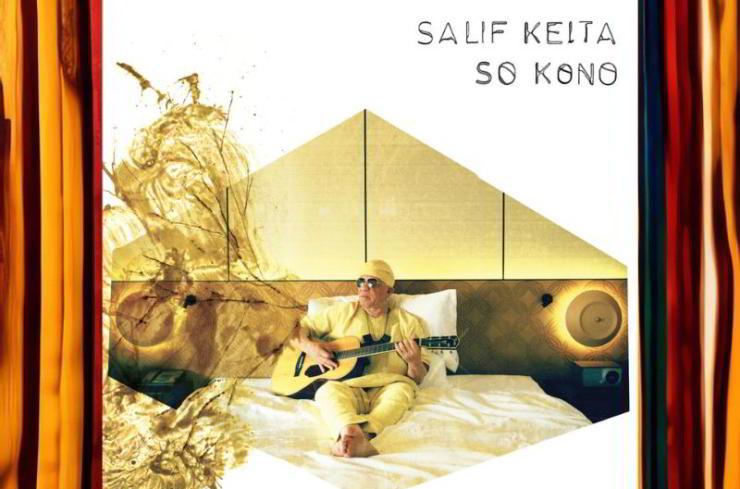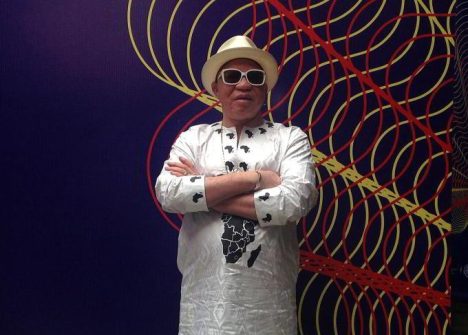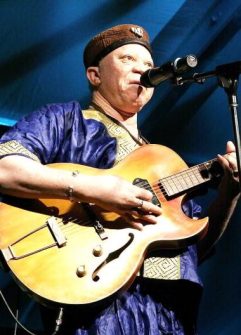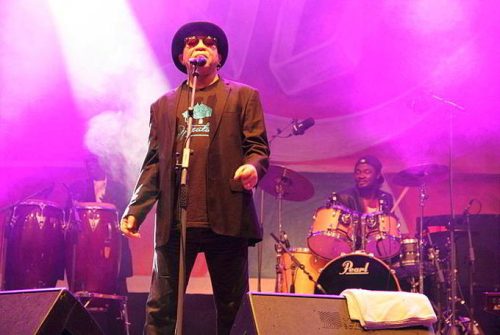Music. Salif Kaita. Sounds in a Room.

So Kono, “in the room”, the latest effort by 75-year-old Salif Keita. Nine acoustic songs to take stock of a career that has seen much of local music and a unique singer who doesn’t disdain politics and the new course of the military.
It’s hard to stop composing and singing new songs, especially when you’re the golden voice of Africa. Salif Keita, a 75-year-old Malian musician and one of the most famous exponents of world music, after announcing his retirement from the scene in 2018, not only continued to perform on stages around the world but released his twentieth album, So Kono last April. Nine acoustic songs, composed during his participation in the Kyotophonie Festival in Japan in the summer of 2023, which have the peculiarity of having been recorded in the muffled atmosphere of a five-star hotel room, the Ritz-Carlton in Tokyo.

The “golden voice of Africa”. CC BY-SA 4.0/ProtoplasmaKid
So Kono in the Malinké language means “In the Room” and the album cover portrays Keita sitting on the bed (an involuntary reference to John Lennon?) with a guitar in his hand. Accompanied in some songs by Badié Tounkana playing the ngoni (a traditional West African string instrument) and by Mamadou Koné on the calebasse (percussion), the legendary singer of Mandinga music performs, for the first time in his long career, only with voice and guitar “in a totally spontaneous approach”, as he writes on his Facebook page. In May, Salif Keita went on a European tour with stops in Paris, Amsterdam, Berlin, London, Barcelona and Madrid.
Among the new songs on the album, Kanté Manfila is a tribute to the Guinean guitarist and composer who died in Paris in 2011. The late musician had directed Les Ambassadeurs du Motel de Bamako, the group in which, since 1973, the young Salif also sang and played. “Kanté guided my steps in the knowledge of music by teaching me everything: he was not only a teacher, but a friend and a brother,” Keita said of him in a recent interview with France 24.

Salif Keita in concert. CC BY 2.0/John Leeson
The “golden voice of Africa” made his debut in the legendary Rail Band, the orchestra that played at the buffet of the Hotel de la Gare in Bamako and that, reinventing tradition with the contribution of new Caribbean rhythms, was a school for many Malian musicians in the early Seventies. In the latest album there is also a version of Soundiata – among the Rail Band’s pieces most loved by the public – which celebrates Soundiata Keita, the founder of the Mali empire in the 13th century.Salif’s family descends directly from the creator of that empire that extended from the Atlantic Ocean to Nigeria, but belonging to a noble lineage represented an obstacle for him in following his musical vocation.
His childhood and adolescence were marked by the difficulties caused by his being an albino, by society’s ostracism towards those with light skin and considered responsible for evil. He often expresses his deep suffering in his songs, such as in the poignant Folon, a 1995 album dedicated to albino children.

The Salif Keita Global Foundation fights against discrimination, denouncing cases of aggression against albino people and offering them support and protection. CC BY-SA 3.0/Barnay
The Salif Keita Global Foundation, which he founded in 2005, fights against discrimination, denouncing cases of aggression against albino people and offering them support and protection. In 1996, after living in the Ivory Coast, where he recorded his first album, Mandjou, and in France, Salif Keita returned to Bamako and opened a recording studio open to young artists – Fantani Touré and Rokia Traoré would pass through – to help them develop Mandinga music. A heritage of “invaluable wealth”, says the 75-year-old musician: “It is essential to transmit its beauty, rich in centuries of history, and share what we have inherited so that it continues to shine”, Keita adds. It is also important to preserve traditional instruments, which are increasingly less played with the passing of expert musicians such as Toumani Diabaté, who passed away last July, an unparalleled virtuoso of the kora who accompanied him in many concerts. (In the Heart of the Moon, recorded by Toumani in 2004 with Ali Farka Touré, another legendary figure of Malian music -1939-2006- winner of a Grammy Award, remains an absolute masterpiece over time). In order to promote interest in the music of the past and make traditional instruments known, Keita created the Festival des Musiques Endogènes du Mandé in his native town – Djoliba on the Niger River, 40 kilometres from the capital. The icon of Mandinga music did, however, intervene last summer in London, in front of 80 thousand fans, in the performance of the Nigerian rapper, Burna Boy and appears on the very popular platform, Malirapbuzz while joking with the young Rasta Lebouzou. “Rappers are the modern griots,” he says, “because they talk about African problems and invite the public to know the reality.”

“The music world, for which Keita has always been a model, is disappointed by his constant political stances”. CC BY-SA 4.0/Schorle
In recent years, Salif Keita has openly taken sides in politics, supporting the current government led by the military, who came to power first with the coup that deposed President Ibrahim Boubacar Keita on 18 August 2020 and then with a new pronouncement in 2021, which further consolidated their control over the government. The musician was part of the National Transitional Council, and on 14 August 2023, he was appointed advisor to the president of the junta, General Assimi Goita. “In the past, Mali was divided, it did not exist, we wanted to be united around Malian dignity. The generals came, they fought because Mali needs them to unify the country, they came to secure the territory, not for power”, he explained in this way in the interview with France 24; a reason that his compatriots were unable to hear (the network’s broadcasts have been suspended in Mali since March 2022). Not everyone seems to appreciate his activism: “The music world, for which Keita has always been a model, is disappointed by his constant political stances” says Manny Ansar, the creator in 2001 of the Festival au Desert, which until 2012 was celebrated every year in the north of Mali in Tessalit, Essakane, Timbuktu, with the participation of international stars and hundreds of foreign tourists.(Open Photo: Salif Keita/Facebook)
Anna Jannello



